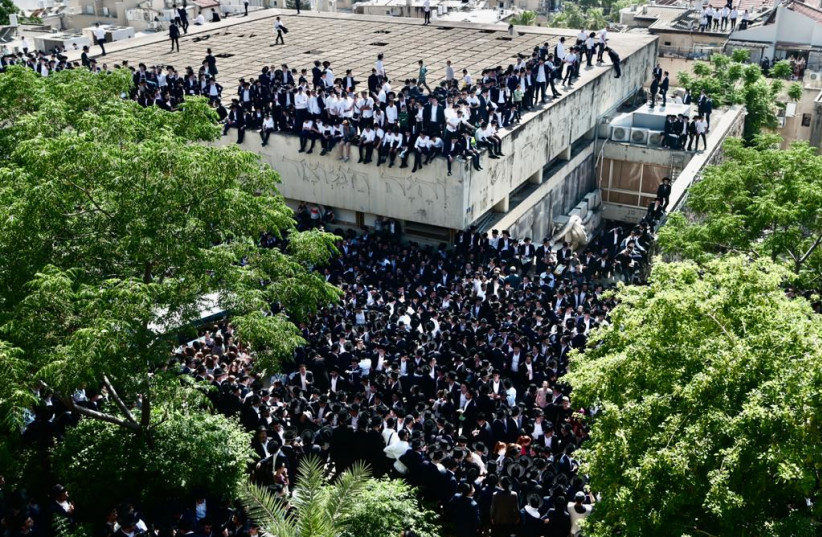The death of Rabbi Gershon Edelstein, one of the most senior ultra-Orthodox rabbis in Israel and the spiritual leader of the Degel HaTorah Knesset faction, signifies the end of an era.
Aside from the fascinating phenomenon in which a 100-year-old rabbi delivered classes to his students till the evening before he died, the implications for the general ultra-Orthodox communities in Israel and worldwide are dramatic: To date, there was always one major rabbi, who not only served as president of the Moetzes Gedolei HaTorah (Council of great Torah [Sages]), who was considered to be gadol hador, the "great/est (one of) the generation," who led the mainstream group of ultra-Orthodox Jews, who are called the Lithuanian or Litvish or Yeshivish haredim (ultra-Orthodox Jews).
For decades, the gadol hador was considered to be the main leader of all haredi Jews (who aren’t Hasidic) regardless of the yeshiva which they attended or the sub-group they were members of. Edelstein was the head of the Ponevezh Yeshiva, one of the two most prestigious yeshivas in Israel (together with the Hevron Yeshiva in Jerusalem), but that didn’t matter to his followers from all yeshivas as well as rabbis from all other institutions, who saw Edelstein as the highest halachic authority.
Ponevezh yeshiva, located in Bnei Brak has thousands of students, single and married men.
After the death of Rabbi Aharon Leib Shteinman in 2017, who was also the gadol Hador, Edelstein became the joint new spiritual leader of the Degel Hatorah political party alongside Rabbi Chaim Kanievsky. Following Kanievsky’s death in 2022 at the age of 94, Edelstein became the sole leader until his own death.

As the head of the Moetzes Gedolei HaTorah in Israel, he was the supreme authority for the Agudath Israel movement in Europe as well.
This list of senior rabbis has been headed previously by the late Rabbi Elazar Shach, who served as president of this prestigious Moetzes Gedolei HaTorah from the 1970s till his death in 2001. He too lived till a very old age, 102.
There are no official successors to be the senior rabbi of the non-hassidic haredi world
But there are no official heirs to this throne, even though there are many who see themselves as such. As opposed to hassidic communities, where the rebbe determines who his successor will be, usually one of his sons, in the Litvak world, it is much more complicated. There aren’t any rabbis in these communities that would be accepted by the rest of the senior rabbis and heads of yeshivas.
One of the mentioned heirs is 93-year-old Rabbi Dov Lando, head of the Slabodka yeshiva in Bnei Brak, alongside Rabbi Moshe Hillel Hirsch. In addition to his role at the yeshiva, Lando is also a member of the directorate of the Board of Yeshivas, another prestigious role. But is Lando someone that the entire haredi community looks up to? Absolutely not.
The next generation of gedolei hador will comprise a number of rabbis. If you will, it will be a generation of niche rabbis. When Kanievsky was the gadol hador, he was everyone's leader and mentor. The same was with Edelstein.
Many obituaries define Edelstein as the last of the Marans (an honorific title for exceptionally respected rabbis who are considered influential teachers and leaders), but perhaps it is more accurate to see him as the first in the era of decentralized leadership.
N12 correspondent Yair Cherki wrote on Tuesday that “Edelstein was an educator. His motto was to educate 'in the ways of pleasantness.'” Cherki explained that during the COVID-19 pandemic, Edelstein’s instructions were to “not only protect one’s body but also one’s mind.” Examples that Edelstein gave during the pandemic were the importance of the use of humor at home and to try and stay away from conflicts with their children.
Many acknowledged the fact that Edelstein was consistent in his approach of outreach towards those who have decided to leave the haredi communities - but in a very different way than his predecessors, with a strategy of avoiding friction.
There are many different scenarios as per how the leadership of this large community will be built. Many say that there will be at least two gedolei ha’dor or possibly even a group leadership of a number of rabbis.
As well as Rabbi Lando, there are talks that he will head the Litvak communities together with 87-year-old Rabbi Moshe Hillel Hirsch, who also heads the Slabodka Yeshiva in Bnei Brak. Hirsch is originally from the United States, and studied at Lakewood Yeshiva in New Jersey under the guidance of Rabbi Aharon Kotler, a renowned Talmudic scholar.
Age is a major factor in choosing a new gadol dor and therefore there aren't expected to be any young and surprising candidates.
This situation will also influence many ultra-Orthodox Jews outside of Israel, since most of the non-hasidic communities see themselves as connected to the gadol hador in Israel. Senior rabbis around the world would always listen to the decisions of the most senior Israeli rabbi, but if there are a few of them, this can become complicated.
Sources in the haredi Jewish communities in the diaspora said on Tuesday that there are rumors that Lando is expected to soon travel to the US and visit the ultra-Orthodox Jewish communities that are affiliated with the Litvak communities such as Lakewood and others.
The inheritance wars have only just begun.
